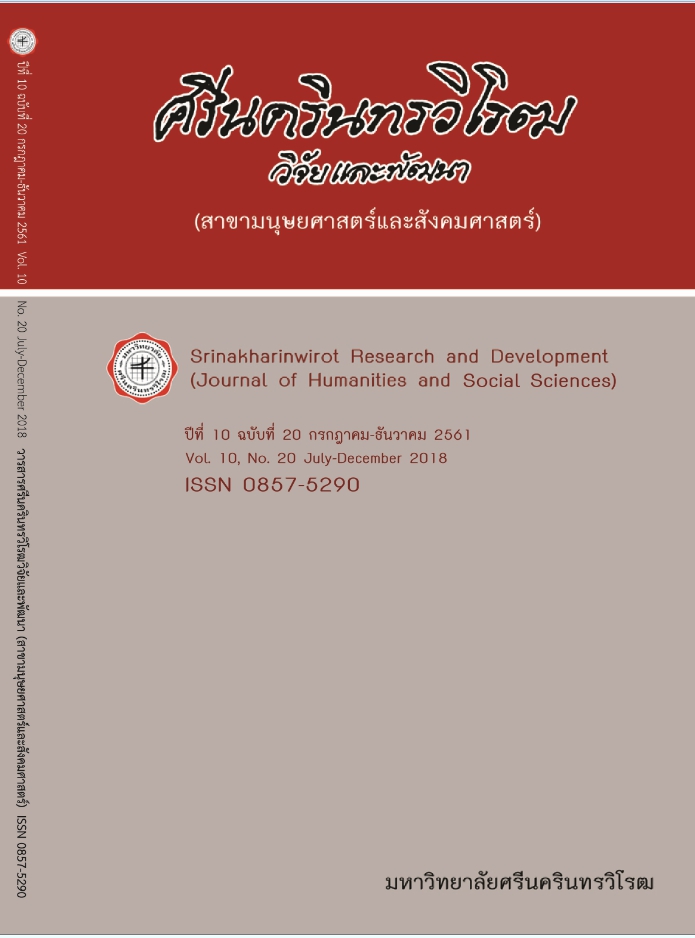ผลของการสอนกลวิธีการฟังที่มีต่อความสามารถในการฟังของผู้เรียนคนไทยผู้ใหญ่ที่เรียนภาษาอังกฤษเป็นภาษาต่างประเทศ EFFECTS OF LISTENING STRATEGY TRAINING ON THE LISTENING PERFORMANCE OF THAI EFL ADULT LEARNERS
Keywords:
Listening Strategy Training, Listening Performance, Thai EFL Adult LearnersAbstract
The objectives of this study were to investigate the extent to which Thai graduate students used the listening strategies they had been trained to, the effect of the training on their listening performance, and their opinions regarding the listening strategy training materials. Twenty-four Master’s Degree students who needed to attain the English proficiency level required for graduation voluntarily participated in the 15-hour listening strategy training over a period of 10 weeks. The participants were trained to use certain cognitive and metacognitive strategies. One week after the training, they took a Chulalongkorn University Test of English Proficiency (CU-TEP), a standardized English test developed and administered by Chulalongkorn University. Their scores were compared to those of the latest CU-TEP they had taken before joining the study. The analysis of the means of the two test scores using a dependent samples t-test revealed no significant difference. However, the questionnaire the participants completed after taking the post-training CU-TEP revealed that they had employed the listening strategies which they had learned at a high level and they expressed favorable opinions of the listening strategy training materials. They considered the strategy instruction highly beneficial to the improvement of their English listening skills. Finally, limitations of the study are discussed for further studies.
Downloads
References
[2] Piamsai, C. (2011). An investigation of the use of listening strategies and listening performance of proficient and non-proficient language learners. Retrieved February 9, 2014, from https://www.academia.edu/4726925/Use_of_Listening_Strategies_and_Listening
[3] Bennui, P. (2007). A survey on first-year students’ opinions concerning causes of their low performance in listening in the English II course at Thanksin University, Phatthalung. In The Second Biennial International Conference in Teaching and Learning of English in Asia: Exploring New Frontiers. (pp.1-15). Malaysia: Faculty of Communication and Languages, Universiti Utara Malaysia.
[4] Kajornboon, A. (2011). An investigation of factors inhibiting Thai EFL Medical students’ listening comprehension (Research report). Bangkok: Chulalongkorn University.
[5] Chonprakay S. (2009). An investigation of listening problems of Thai undergraduate students. Master thesis, King Mongkut’s University of Technology North Bangkok.
[6] Oxford, R. L.; & Burry-Stock, J. A. (1995). Assessing the use of language learning strategies worldwide with the ESL/EFL version of the Strategy Inventory for Language Learning (SILL). System. 23(1): 1-23.
[7] Helgesen, M.; & Brown, S. (2007). Practical English Language Teaching: Listening. New York: McGraw-Hill.
[8] Park, G.P. (1997). Language Learning Strategies and English Proficiency in Korean University Students. Foreign Language Annals. 30(2): 211–221.
[9] Nisbet, D. L., Tindall, E. R.; & Arroyo A. A. (2005). Language Learning Strategies and English Proficiency of Chinese University Students. Foreign Language Annals. 38(1): 100-107.
[10] Vangergrift, L. (2003). Orchestrating strategy use: Toward a model of the skilled second language listener. Language Learning. 53(3): 463-496.
[11] Chamot, A. U.; & Küpper, L. (1989). Learning strategies in foreign language instruction. Foreign Language Annals. 22(1): 13-24.
[12] Liu, S. H. (2008). Listening comprehension strategies and learning styles in foreign language education. In Paper presented at the British Educational Research Association Annual Conference, Heriot-Watt University, Edinburgh, 3-6 September 2008.
[13] Piamsai, C. (2005). The relationships between learning strategies and English computer-based listening test performance of Thai university students. Unpublished Doctoral Dissertation, English as an International Language, Graduate School, Chulalongkorn University.
[14] Phillips, V. (1991). A look at learner strategy use and ESL proficiency. CATESOL Journal. 4: 57-67.
[15] Li, W. (2013). A Study of Metacognitive Awareness of Non-English Majors in L2 Listening. Journal of Language Teaching and Research. 4(3): 504-510.
[16] Hanafiyeh, M.; & Mafakheri, M. (2013). The Effect of Metacognitive Listening Strategy Training on Iranian EFL Learners’ Listening Performance. Journal of Science and today's world. 2(1): 109-122. Retrieved December 17, 2017, from www.journalsci.com
[17] Moradi, K. (2012). The impact of listening strategy instruction on academic lecture comprehension: A case of Iranian EFL learners. Retrieved June 11, 2018, from https://www.sciencedirect.com
[18] Li, Y.; & Liu, Y. (2008) The Impact of Strategies-based Instruction on Listening Comprehension English Language Teaching. 1(2): 128-134.
[19] Zarrabi, F. (2017). How explicit listening strategy instruction affects listening comprehension of different learners. Journal of Language Teaching and Research. 8(4): 655-662.
[20] Kettongma N.; & Wasuntarasobhit, S. (2015). Effects of Prosodic Feature and Cognitive Listening Strategy Instruction on Low-Intermediate EFL Learners’ Listening Comprehension. KKU Research Journal (Graduate Studies). 3(3): 65-83.
[21] Cross, J. (2009). Effects of listening strategy instruction on news viodeotexts comprehension. Language Teaching Research. 13(2): 151-176.
[22] Ngo, N.T.H. (2016). The Impact of Listening Strategy Instruction on Listening Comprehension: A Study in an English as a Foreign Language Context. Electronic Journal of Foreign Language Teaching. 13(2): 245-259.
[23] The IELTS 9-band scale-British Council. (2018). Retrieved June 11, 2018, from https://www.britishcouncil.it/sites/default/files/ielts_guide_for_teachers_italy.pdf
[24] Opanon-Amata, P. (2003). The Predictive Validity of the CU-TEP Test on the Achievement in the Business English for Graduates Course. Retrieved December 17, 2017, from https://www.culi.chula.ac.th/Research/e-Journal/Revising.pdf
[25] Thompson, I.; & Rubin, J. (1996). Can Strategy Instruction Improve Listening Comprehension?. Foreign Language Annals. 29(3): 331-342.
Downloads
Published
How to Cite
Issue
Section
License
Srinakharinwirot Research and Development Journal of Humanities and Social Sciences is licensed Under a Creative Commons Attribution-NonCommercial-NoDerivs 4.0 International (CC-BY-NC-ND 4.0) License, Unless Otherwise Stated. Please Read Journal Policies Page for More Information on Open Access, Copyright and Permissions.



